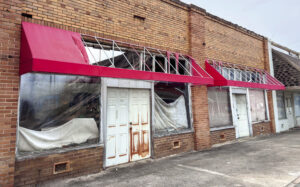Navy: NAS Meridian's mission essential'
By By Buddy Bynum / editor
April 25, 2002
NAS Meridian is out of the running as home base for the Navy's newest jet fighter squadrons, but its position as the "premier initial jet training installation" has been strengthened, U.S. Rep. Chip Pickering, R-Miss., said Wednesday.
Pickering said he was notified by Assistant Navy Secretary H. T. Johnson "it is highly probable that NAS Meridian will not be a likely candidate for basing the Navy's East Coast Super Hornet squadrons." NAS Meridian was one of four potential sites for the Navy's F/A 18 Super Hornets and their permanent attachment of pilots and support personnel.
A Navy review found "we could not safely operate both the training wing and the F/A 18s at Meridian," Johnson said in an April 17 letter to Pickering. "Locating the Super Hornets at NAS Meridian would result in moving the training wing from Meridian, and there is no single location where we could do so effectively and efficiently."
Johnson said "moving initial training from Meridian would cause unacceptable degradation to our training operations."
Pickering met with Johnson the week of April 8 in what has been a continuing review of NAS Meridian's potential role in the Super Hornet program. Nearly 60 percent of all U.S. Navy and Marine Corps "strike-aviators" the Navy's term for pilots who train for duty aboard aircraft carriers train at NAS Meridian before they move on to fleet aircraft. With newer planes and flight training simulators, Johnson said NAS Meridian was an "excellent training ground."
The apparent decision to eliminate NAS Meridian from the Super Hornet project was viewed positively by local officials.
Meridian businessman Lamar McDonald, who heads the Navy Meridian Team, said Navy officials were impressed with NAS Meridian's operations during recent site visits.
Ken Storms, Meridian's chief administrative officer and a former commander at NAS Meridian, said the Navy has recognized "what a tremendous operational asset" the base is to the Navy. With its "unencroached" landing and targeting areas, he said NAS offers training elements that cannot be easily duplicated elsewhere.
Storms also said it is "never prudent" to mix student pilots with more experienced aviators, as would have happened if NAS Meridian retained its training mission and had been selected as the Super Hornets base.
With a dozen U.S. aircraft carriers now operating around the globe, and given their missions' needs for pilots and planes, Storms said NAS Meridian remains "a diamond" that could attract an expanded role in national security.







